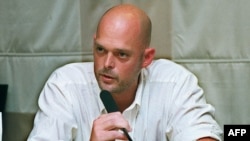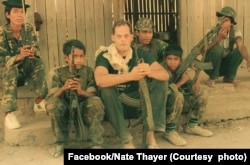Nate Thayer, a journalist who risked his life to confront Pol Pot and provided perhaps the most authoritative contemporaneous account of Cambodian politics in the 1990s, died at his family’s home in Massachusetts this week. He was 62.
Thayer arrived in Southeast Asia in the late 1980s as a stringer for the Associated Press on the Thai border amid a brutal civil war in Cambodia, and over the next decade established himself as a dominant deadline reporter covering one of the world’s most important stories — the end of the Khmer Rouge and emergence of “modern” Cambodia.
“He was fearless in terms of his work style, and he was uncompromising when it comes to pursuing the truth, and then on a regular basis, he scooped the world with his stories on Cambodian political conflicts,” said Ker Munthit, a former Cambodian journalist who worked with Thayer at the Phnom Penh Post in the 1990s.
No series of scoops was bigger than Thayer’s reporting on the trial of Pol Pot in 1997 and interview with him a few months later. But he also unearthed stories on renegade Montagnard combatants abandoned in Cambodia’s jungle, heroin trafficking networks linked to Cambodia’s elite, and factional fighting that saw tanks return to the streets of Phnom Penh after a few years of relative peace.
Thayer was a sharp writer — filing lengthy dispatches for publications including the Post and Far Eastern Economic Review — but his sources were what truly set him apart in the post-war media milieu in Phnom Penh, thanks in part to relationships forged through months spent with anti-communist resistance forces along the Thai border earlier in the 1990s.
“He went further than all of us,” said Kevin Barrington, an Irish journalist who also worked with Thayer at the Post throughout the mid-90s. “He’d go off on serious treks deep into Cambodia with guerillas, you know, he had an appetite for risk.”
Thayer nearly died during one of those trips. In October 1989, he was riding with a group of Cambodian guerillas when the vehicle went over two anti-tank mines. The driver of the truck was killed, and Thayer suffered a concussion and severe shrapnel wounds.
But he survived and kept covering the conflict raging in Cambodia’s jungles, driven by an obsession with tracking down the man who led the Khmer Rouge as it murdered and starved to death some 3 million Cambodians during its four-year reign in the 1970s.
“Although he did many things in Cambodia, he never deviated from that mission that he had to find Pol Pot. And that was a complete obsession,” said Nayan Chanda, the former editor of the Far Eastern Economic Review. “And he was very dogged and took a lot of risk and did some crazy things to achieve that.”
The breakthrough came when Pol Pot became desperate. In 1997, the longtime KR leader, in a fit of violent paranoia, believed his longtime defense minister Son Sen was negotiating a peace deal with the Phnom Penh government behind his back, and ordered his murder. Son Sen was shot dead along with his wife, children and other family members.
Brother No. 1 was arrested by rival KR commander Ta Mok amid the chaos that followed, and Thayer, along with cameraman David McKaige, were invited — through a “series of furtive rendezvous, using coded messages over mobile phones” — to document the show trial that followed, as he wrote in the Far Eastern Economic Review.
“Crush! Crush! Crush! Pol Pot and his clique!” shouted the crowd on cue as we approached, their fists striking down towards the ground.
There, slumped in a simple wooden chair, grasping a long bamboo cane and a rattan fan, an anguished old man, frail and struggling to maintain his dignity, was watching his life vision crumble in utter, final defeat.
This was how the “people’s tribunal’ began for Pol Pot, reviled around the world for personally orchestrating a reign of terror that left more than a million human beings dead and shattered the lives of many millions more.
Pol Pot was sentenced to die in a hut in the dense jungle hideout of Anlong Veng. The trial was the first time the notorious war criminal had been seen by the western world in decades, and Thayer’s footage was broadcast on ABC News’s “Nightline” — beginning a nasty yearslong legal dispute over rights.
A few months later, it was Pol Pot who reached out through intermediaries to arrange an interview. Chanda said he received a call at his Hong Kong office from France, saying that “uncle” was ready to see Thayer. After a few days of trying to get Thayer the message, Chanda said they discussed how he would get to the border hideout. Thayer suggested an armed personnel carrier from Phnom Penh. Chanda demurred, and they settled on a flight to Bangkok and a drive across the border.
Pol Pot was old and could barely walk without help. Thayer wrote for the Review that Pol Pot was “chillingly unrepentant,” willing to admit to “mistakes” made by the regime but blaming mass killings on others and arguing that were it not for his revolution, Cambodia would have become part of Vietnam.
"I came to carry out the struggle, not to kill people," he rasps, his voice almost a whisper. He pauses, fixing his interviewer with an almost pleading expression. "Even now, and you can look at me, am I a savage person? My conscience is clear."
That was Pol Pot’s last interview before his death the next year — which Thayer also scooped.
McKaige often teamed up with Thayer on reporting trips into western Cambodia and along the Thai border, where democratic resistance forces — aligned with the KR remnants against Hun Sen’s Hanoi-backed government — based their operations.
Now living in Singapore, McKaige said Thayer was a rare foreigner who didn’t bring a political agenda to his work in Cambodia during a time when the country was a flashpoint for geopolitical tensions — with western countries backing an alliance that included the Khmer Rouge rather than legitimize the government installed by invading communist forces.
Many western academics felt that backing a coalition involving the KR was morally intolerable, and were supportive of Hun Sen’s government — which remains in power today and has shown its own willingness to crush dissent over the decades. The duo's reporting also undermined the Hun Sen's government's claims that it was in full control of the country, and showed that the KR-royalist coalition had grassroots support, McKaige said.
“I think he provided some balance to an otherwise extremely left liberal view of what happened in Cambodia,” McKaige said. “Both choices were bad.”
And some of the hardest fighters in Cambodia’s decades of war opened up to Thayer. “He’s an incredibly open and authentic person, and that openness is reciprocated when he talks to people,” McKaige said.
In the wake of what many — including Thayer — viewed as a coup by Hun Sen in 1997 against the royalist Funcinpec party, which won the 1993 UN-sponsored election but ultimately agreed to a coalition government, Thayer interviewed Gen. Serei Kosal for the Far Eastern Economic Review. The royalist commander had fled Phnom Penh via military aircraft and found refuge in a jungle hideout on the Thai border.
He was lucky to have escaped: The coup left scores dead, including two of his fellow generals, and hundreds arrested. Thousands of others are fleeing or in hiding.
“We need a safe haven to protect our people from killing and arrest,” said Serei, dressed in borrowed shorts and shoeless. “Hun Sen is hunting down our people, killing them, arresting them. Why hasn’t the world condemned the coup makers and acted in support of democracy and against the dictators?”
By that time, the Khmer Rouge were largely relegated to their border stronghold. What was left of the regime continued to make menacing threats on the radio, while many defectors were folded into the new government.
Barrington, who later worked for Agence France-Presse in Phnom Penh, said that Thayer’s relationships with his Khmer Rouge sources made some of his colleagues uncomfortable, and at times other reporters felt he was going too soft on senior leaders like former head of state Khieu Samphan when he scored rare interviews with them.
“But I think this was all part of his uber plan to try and get to Pol Pot,” Barrington said. “And to be fair Nate, when he did get to Pol Pot, he didn't back away from asking him tough questions.”
During one of Thayer’s multiple bouts with malaria, Barrington said a Khmer Rouge official arrived at a group house, where a number of journalists lived together, to deliver a Chinese antimalarial to the ailing reporter.
But Thayer kept other journalists largely in the dark about his sources. “His favorite phrase was ‘if I told you that I'd have to kill you,’ and he used to chew tobacco and he had marvelous contacts, like there would always be these people kind of coming in to see him who disappeared upstairs and it would all be very hush hush,” Barrington said.
Thayer’s persona ran counter to his upbringing as the son of a decorated diplomat and elite Boston family, noted Chanda.
“The thing that I found interesting was that despite his very austere Boston Brahmin upbringing, he almost deliberately wanted to project a different image as a swashbuckling sort of dare-devil reporter,” Chanda said.
Thayer worked hard and played hard. Mark Dodd, his friend and colleague and the former Reuters Cambodia Bureau Chief, recalled a late night drinking session with Thayer — a physically imposing former college swimmer.
“We were off our tits yet early next morning Nate managed an epic swim across the Bassac River beating the Cambodian Olympic swim team entrants,” he wrote in an obituary “In an ironic twist, co prime minister Norodom Ranariddh had to present his sometimes critic an award which was even more hilarious. Nate really liked that touch.”
Thayer often shared an anecdote about charging the AP nearly $500 for gin and tonics at one point, arguing it was a medical expense given the antimalarial quinine in the tonic. But drinking would also become a lifelong demon.
“Anybody who did the stuff we did, and continue to do it, in the spirit of trying to bring horrible things to the world's attention, are always gonna be a little rough around the edges,” said McKaige.
“Coming in to land after years of adrenaline fuelled frontline reporting is a daunting challenge for all of us who’ve been there,” wrote Dodd. “Not just a few stumble and fall.”
Thayer would go on to report from around the world, often war-torn or authoritarian countries including Iraq, the former Yugoslavia, Cuba and North Korea. For the past two decades he has mostly lived in the U.S., for years in a Maryland farmhouse and most recently on Cap Cod.
Munthit recalled visiting him at his farmhouse in the early 2000s. He would sleep until the early evening, wake up to feed the ducks in a nearby pond, and then spend the night working on his memoir, titled “Sympathy for the Devil.”
The book remains unfinished. Un Sokhom, a former publisher of an opposition newspaper in Cambodia, said the country had lost a rare living witness to the man who oversaw the massacre of so many.
"We are very sad that the ideas and further publication that he wrote and prepared for release have not been released. It will be buried," he said.
But that may not be so. Barrington said Thayer left behind a manuscript, and his friends are talking about how they can finish the book that he never did.
VOA Khmer reporter Sok Khemara contributed reporting.










